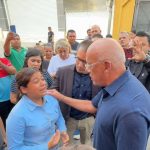No white smoke came out of the former Congress in Santiago. In that place, this Thursday a new extended meeting was held between all the political forces with parliamentary representation with the aim of directing the constituent process. But there was no agreement, which is seen further and further away due to the differences between the ruling party – I approve of Dignity and Democratic Socialism – and the opposition, with Chile Vamos in the lead, leaving everything at a standstill.
But the truth is that until now, from inside the official conversation table – convened by the presidents of the Chamber and the Senate, Raúl Soto (PPD) and Álvaro Elizalde (PS) – they admit that it has been impossible to move towards a document official uniting the different positions. An official source points out that some parties in Chile Vamos, such as RN, do not have a common position, and that their internal differences are affecting the process of the talks.
The ruling party recognizes that the talks are at an impasse and criticizes the leadership of Elizalde and Soto. They point out from Approve Dignity that the presidents of both chambers try to get along with everyone and further extend participation to all sectors, which prevents the flow of conversations from being more fluid.
Deputy Guillermo Ramírez (UDI) himself recognized that the first meetings seemed like a “school dining room” and for that reason an attempt was made to reduce the space, calling a bilateral meeting. Now it turns out that this space is expanding more and more every day and that is creating obstacles. A source from Approvebo Dignidad points out that neither Elizalde nor Soto nor the party presidents of Chile Vamos will recognize this reality, because it would violate their initial commitment.
Already in the internal of each sector, everything is classified as “slow”, according to sources familiar with the negotiations. In this slowness, I Approve Dignity appears as the one that is advancing a little faster, but still far from uniting consensus to present a unified proposal from the ruling party. On the other hand, in Democratic Socialism, they are even further from this, since they still have not managed to settle the constitutional “edges”. This worries AD as it will slow down the deal even further.
No agreement with the right
The right is the other obstacle that prevents the agreement from advancing, since both in AD and in SD they see how in the opposition bloc there are still differences on specific issues, such as the entry plebiscite, which does not add all the necessary supporters. Another obstacle between the ruling party and the opposition is that the body that drafts a New Constitution be elected 100% by the citizens, which generates rejection in Chile Vamos, but as the president of the PS -Party of Democratic Socialism- Paulina Vodanovic indicates, she still does not have alternatives from that sector.
“The right, Chile, come on, specifically has not answered this mechanism and has not told us what its counterproposal is regarding this. It has been insistent on the issue of the bases, now called institutional principles, in what we have advanced and already we have enough agreements,” he said, and then called for prompt progress in a definitive agreement between all political forces.
“I don’t think we have to talk about the right. Here we clearly have several rights, we have a right that is outside shouting that they are these so-called patriots, that the truth is that they have little of patriots because what they are doing is wanting to violate the will for dialogue. And what could be more patriotic than all the political forces sitting at a table. Therefore, I believe that there are people who do not have a democratic will, there is a right that has a hard position and there is another part of the right that has a willingness to dialogue,” added Vodanovic.
On the ruling front, they fear that part of the right is carrying out a strategy of oppression, a sector that seeks to extend the discussion as long as possible, trapping the possibility of reaching agreements. This, because not only the issue of the drafting body generates discrepancies, there are also other knots such as the role of the State -social and democratic state of law-, freedoms and how this coexists with free choice in health, education and welfare. The great difficulty -they raise from officialism- is that the right demands that within social rights civil society and the private world are not excluded.
Diego Ibáñez, deputy for Social Convergence, slipped this: “We have been in talks for almost a month, and we very much want to be honest with the citizens. It has been very complex to continue advancing, because for us the agreements we have so far seem sufficient ( …) and at the front we have an arrogance, an intransigence, which in my opinion is related to feeling that we own 62%”.
“After much effort, we must confess that it is very complex to advance the agreements. (…) We want to be honest, we are not available for the New Convention to be worse than the 1980 Constitution (…) This is reaching a turning point and if we don’t solve this next week it is very difficult for us to offer Chile the certainty that the constituent process continues,” acknowledged Ibáñez, warning of this impasse.
On the right, the president of the UDI, Javier Macaya, lamented “that some propose from the logic of doing everything the same, repeating exactly the same exercise of the Convention that failed and others who propose doing nothing.” “Today there is an exercise that is finding coincidence in certain constitutional principles. If you review the Approval proposal to reform the parties of Democratic Socialism, you are not going to find the plurinationality that some are defending today, you are going to find with a consecration of property rights, they will find that Chile is a single nation. I believe that there are principles in which we are going to continue advancing and progress has been made; here let’s not say that progress has not been made, “he added.
They recognize from the table that this must be resolved before October, or else they do not give the times, considering the interest of the ruling party to have conventional elections next April, a date reported by the Electoral Service (Servel), those who recommended not holding elections in the country before that date.
It is paradoxical that the confirmation of this group of eight – which brought together the ruling party, opposition and DC – did not achieve its goal, which was to reach a concrete agreement on constitutional bases. The formation of this space, at the initiative of the president of the Senate, not only caused the marginalized sectors to promote the creation of a parallel table, but it has extreme positions, and now they find themselves without concrete agreements. With the talks at an impasse, the great loser is the ruling party, which after the failure of the exit plebiscite, clung to trusting the promise of the right in favor of a new Constitution. For now, in the short term, the meeting participants will be summoned the next jnine at 10 in the morning to resume the dialogue.
Republicans leave
In parallel, a meeting of the alternative table was held, made up of PDG, Republicans, independent senators belonging to the Chilean Let’s Go and Amarillos por Chile caucuses. The instance also had the participation of Franco Parisi, who participated telematically.
At the exit, the president of the Republicans, Ruth Hurtado, announced that she will withdraw from the instance, arguing that they are not here because a new Convention is formed and that it should be Congress that addresses the reforms to the Constitution.
Republicans have expressed their discomfort at how the talks are progressing, as they believe that a process very similar to the one carried out by the failed Convention is being outlined. They demand that Chile Vamos make their positions more harshly noted, to prevent the ruling party from becoming empowered, understanding that it was the force defeated in the exit plebiscite.
Macaya, from the UDI, described this departure as “serious”: “For me it is just as serious to leave a conversation table when I was even demanding, until yesterday, to participate in this conversation table. And it is very contradictory that today One day the Republican Party rises up at this conversation table. We are going to defend in Chile Let’s go the instance of participation, of dialogue. It is for what we are doing politics”.


















